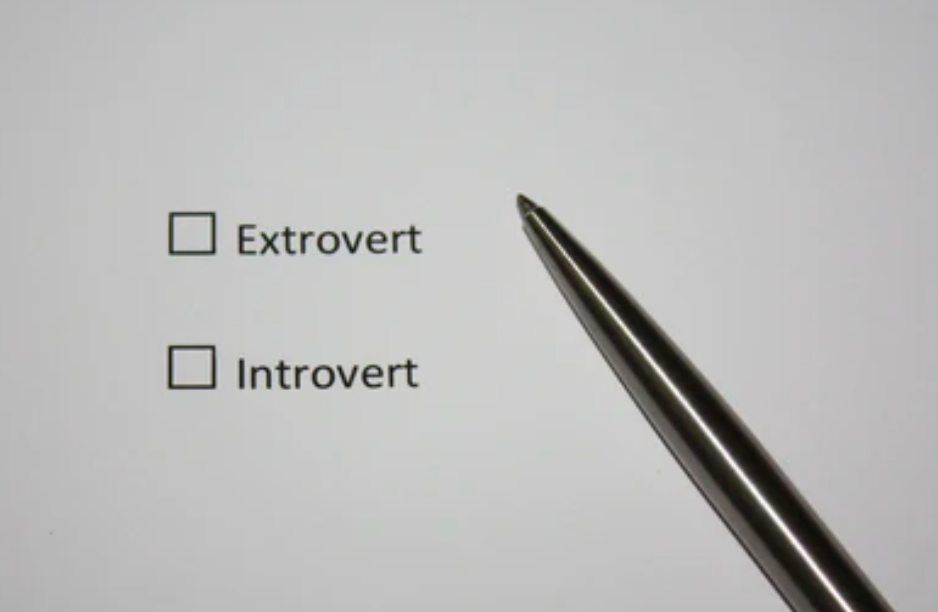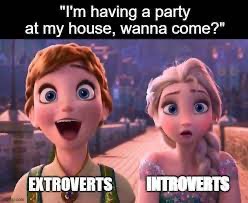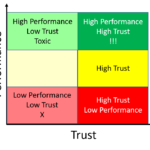
Hi All,
In this article, we are covering the prominent personality trait Extraversion/Introversion which is commonly mentioned in mainstream media however, I believe that the nature of it is often misunderstood. Below, we will clean up the most common misperceptions.

Enjoy!
Introversion vs. Extraversion
Getting right to the point: How introverted/extraverted a person is does not depend on their sociability but rather on their nervous system sensitivity and how they recharge.
We will break this statement down in a second, but first, let’s cover the basics:
- Introversion vs. extraversion aren’t separate boxes but measured on a continuum. In science, researchers speak about the personality trait “extraversion” (it’s a core personality trait of the Big Five) – People who score high on extraversion are (you guessed it) extraverts, people who score low on extraversion are introverts and people who fall in the middle of the spectrum are ambiverts.
- The correct terms are “IntrOversion” and “ExtrAversion” stemming from the Latin words “intro” meaning “inward/within” and “extra” meaning “outward”.
- Compared to other personality traits, extraversion has a strong genetic component, meaning it is highly heritable.
Now, what do we mean by “nervous system sensitivity” and “recharging”?
The nature of introversion / extraversion
Every person has their own level of sensitivity to outside stimuli, which determines how intensely they perceive the world. Someone with a more sensitive nervous system (NS) picks up on more information and perceives their surroundings more intensely compared to someone with a less sensitive NS. For example, a room can be perceived as very noise by one person, while another might not even register the music in the background. Research suggests that introverted individuals process emotional and mental information more deeply (e.g., in conversation, they can pick-up on more non-verbal cues).
[Side note: there is a difference between introversion and HSP (Highly Sensitive People) – while HSPs perceive everything much more intensely (e.g., itchy clothing can lead to irritation), the sensitivity of introverts is mainly related to emotional and mental sensitivity. While introversion doesn’t imply HSP, according to studies 70% of HSPs are introverts.]
Introverts do not only take more in but also process the absorbed information differently compared to extraverts. While extraverts can think and talk at the same time, introverts often dive into their inside world first before they speak (talk-to-think vs. think-to-talk). Introverts typically reflect and consider their responses more before speaking and focus their attention on the inside and outside world compared to extraverted individuals, who predominantly focus on the outside world.
The difference in how introverts/extraverts digest information and perceive the world reflects in different forms of behaviour, which has led to a lot of stereotypical thinking (e.g., the idea that introverts are anti-social) however, the reasoning is often false. Let me explain: Yes, introverts require more time in quiet settings to process everything they perceive. No, they do not withdraw because “they don’t like people”. In fact, introverts care deeply about their social connections with others. The reason they may leave a party early is simply because ‘their glass is full’ and their nervous system starts to be overwhelmed by outside stimuli.
Also, introversion is not correlated with shyness. Shyness stems from social anxiety (which often shows up as fear of rejection), not overstimulation.

“With a charged social battery, an introvert is indistinguishable from an extrovert — it’s what they do afterward, when they are tired, that differentiates them.”
—Peter Hollins, author of The Science of Introverts
The neuroscience of introversion/extraversion
Let’s have a look inside the brain: Introverts’ and extraverts’ brains function differently on a cellular and chemical level.
Three examples below:
- The dopamine difference:
The brains of introverts and extraverts respond differently to dopamine, a ‘feel good’ neurotransmitter (NT) which is (among other things) responsible for seeking external rewards. Research suggests that introverts are more sensitive to dopamine, which is why they only need a small dose to get the feel-good reward. Extraverts on the other hand have a lower sensitivity which leads to increased stimulation seeking in the outside world. High levels of dopamine cause a “buzz” and excitement in extraverts while it overstimulates introverts.
- Prefrontal cortex (PFC) Gray Matter:
As we have covered in previous publications, the PFC is where we think critically, evaluate rationally, and problem-solve. A Harvard study found that introverts’ brains have thicker grey matter in the PFC compared to extraverts. Even in a relaxed state, introverted brains showed higher levels of activity (i.e., increased blood flow) compared to extraverts. Overall, introverts process information more deeply as stimuli pass through longer neural pathways.
- Acetylcholine:
Similar to dopamine, acetylcholine is linked to pleasure however, this NT makes us feel good when we turn inward. It powers the ability to be introspective, think deeply, reflect, and focus intensely on one thing for a long period. While extraverts crave dopamine to ‘thrive’, introverts crave acetylcholine to feel satisfaction.
Before we move to into the work context, I want to let you know that you can support my work through here: Ko-fi.com/neurosciencemusings – If you choose to do so: THANK YOU!
Does introversion have an image problem?
We live in a society with a strong social bias towards extraversion. Studies have shown that extraverted individuals are more likely to be perceived as influential, confident, dominant, and assertive. This bias can manifest in various ways, such as extraverted employees being more likely to be promoted because their traits are considered ideal and desirable for success.
For a long time, introverts have been criticised for being, e.g., too quiet or slow. However, the progress in neuroscientific research allows us to look beneath the surface and understand the depths of their mental processes and brains’ functioning.
- 70% of people who are considered “gifted” (when they exhibit above-average talent for something) are introverts.
- Introverts more often “do the right thing”: Introverted individuals are less swayed by external events and more guided by their inner morals and personal values. A 2013 study on social conformity found that extraverts are more likely to succumb to social pressure. In contrast, “there was no difference in conforming responses given to high- and low-pressure levels by introverts.”
- Introverts are often highly attuned to others and pick up on non-verbal cues easily. They absorb a lot in communication, which helps them build deep, meaningful relationships.
“There’s zero correlation between being the best talker and having the best ideas.”
– Susan Cain, author of Quiet
What does all of this mean for the workplace?
Leadership:
Harvard Business Review published a study by organisational psychologist Adam Grant, which assessed leadership qualities in introverts and extraverts.
While it is suggested that 50% of the general population is extroverted, 96% of managers and executives display extroverted personalities. The assumption that extraverts (e.g., dominant and outgoing) make the best leaders has influenced hiring and promotion decisions for a long time as they are perceived to be more effective by supervisors and subordinates alike.
While extraverted leaders have great strengths, introverted leaders have shown to be more effective in dynamic, unpredictable environments – particularly when workers are proactive. Grant argues that introverted leaders tend to listen more carefully and show greater receptivity to suggestions. Being open to ideas from employees not only led to more effective problem-solving, but also made the worker feel valued and motivated to work harder.
While Grant argues that introverts make great leaders, he stresses that introverts may have to overcome a strong cultural bias first before they succeed in an extraverted world.
Workplace preferences:
(To note, these are general guidelines and can vary from person to person.)
| Introversion | Extraversion | |
| Problem-solving | After discussion, take the problem away and solve it in a quiet place. | Group brainstorming sessions may be preferred. |
| Work space | Quiet work spaces or WFH may be preferred. | Open space concepts may be preferred. |
| Feedback | Typically prefer a 1:1 setting. | Enjoy to receive positive feedback in a group setting. |
| Information processing | Think-to-talk. | Talk-to-think. |
Strengths:
(Again, these are general guidelines.)
| Introversion | Extraversion |
|
|
My Two Cents
While I believe that it is important to understand and acknowledge the differences in how introverts/extraverts perceive and navigate the world, I think it is crucial to keep in mind that the trait does run on a continuum, and that most people don’t fall into the extreme end of the scale. Also, while the trait is a critical factor in someone’s personality, there are many other dimensions which form a person’s character.
Having said that, I will leave you with the following quote:
“Quiet people have the loudest minds”
– Stephen Hawking
Did this article change how you think about intro/extraversion? If you have any questions or thoughts you’d like to share, you can find me on Instagram @neuroscience.musings.
Have a great day/night wherever you are!!
Best regards,
Sarah
References:
- Benjamin, J. et al.(1996) ‘Population and familial association between the D4 dopamine receptor gene and measures of Novelty Seeking’, Nature Genetics, 12(1), pp. 81–84.
- Grant, A. M., Gino, F., & Hofmann, D. A. (2010). The hidden advantages of quiet bosses. Harvard Business Review, 88(12), 28.
- Johnson, D. L., Wiebe, J. S., Gold, S. M., Andreasen, N. C., Hichwa, R. D., Watkins, G. L., & Boles Ponto, L. L. (1999). Cerebral blood flow and personality: a positron emission tomography study. American journal of psychiatry, 156(2), 252-257.
- Olsen Laney, M. (2006) The Hidden Gifts of the Introverted Child.
- Smillie, L. D. et al.(2010) ‘Variation in DRD2 dopamine gene predicts Extraverted personality’, Neuroscience Letters, 468(3), pp. 234–237.
- Tuovinen, S., Tang, X., & Salmela-Aro, K. (2020). Introversion and social engagement: Scale validation, their interaction, and positive association with self-esteem. Frontiers in Psychology, 11, 3241.
- https://quietrev.com/why-introverts-and-extroverts-are-different-the-science/
- https://ceogenome.com
- https://www.beyondintroversion.com/post/an-introvert-s-craving-for-acetylcholine
- https://www.beyondintroversion.com/post/answers-lie-in-the-science-of-the-introvert-s-brain
- https://www.linkedin.com/pulse/introversion-form-neurodiversity-sam-sheppard-#:~:text=Differences%20in%20the%20nervous%20system,be%20overwhelmed%20by%20excessive%20stimulation.
- https://www.cam.ac.uk/research/news/study-finds-gbs-most-extroverted-agreeable-and-emotionally-stable-regions


